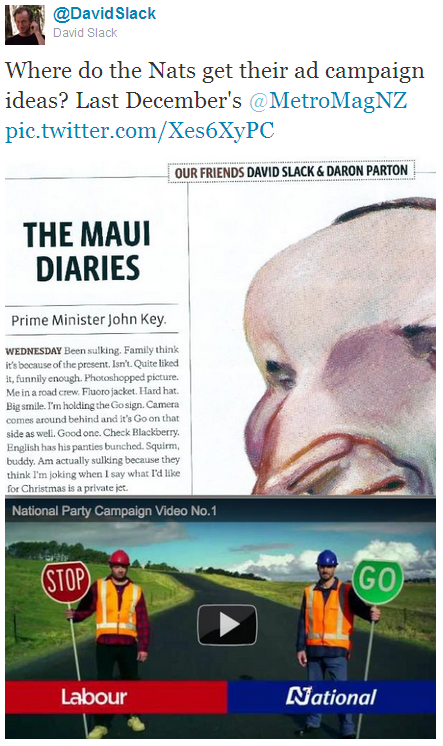I recently tore into Chris Trotter’s argument that polls are deployed to promote a “spiral of silence”, to demoralise those holding non-majority views, and to deter them from political speech and action. I stand by that post, and I still don’t think the argument holds in the general case, but this morning I think we saw an example where polling data was used in just such a way.
National campaign chair Steven Joyce appeared on Morning Report defending the party’s handling of the “teapot tapes” strategy. Joyce came to his Morning Report interview armed with overnight polling data that he says shows 81% of people are sick of the coverage of the teapot tapes, only 13% think the issue is a big deal, and that some in the media ought to take a long, hard look at themselves. Russell Brown covers the topic in more detail; this post began as a comment there).
Leaving aside questions about the veracity of these figures (they could be utterly fabricated and we’d be none the wiser; Bomber reckons they’re bollocks), this actually is a case of a politician deploying polling data to send a message, not only to the media, but to the public: If you care about this you’re out of touch, disconnected, in the minority, obsessed with trivia, and you ought to be ashamed of yourselves. While I disagree with his assessment, what’s more interesting is how he framed that assessment: as a normative argument about what election campaigns ought to be about, and what “real New Zealanders” care about; echoing John Key’s “issues that really matter” rhetoric, which is precisely what all the National supporters I’m in touch with have been saying: nothing to see here, it’s a sideshow, can we get back to the substance, and all that.
Which is pretty ironic given that the Nats have done extremely well for most of the preceding five years by staying the hell away from policy arguments wherever possible. It’s a pretty remarkable position from a National party whose strategic success has been largely founded on a ruthless commitment to campaign realism, expressed by avoiding “noble” pursuits such as the robust policy focus and appearances in the hard-news media in favour of what is effective — personality and brand-focused campaigns, point-scoring, agenda domination, and routine appearances in sympathetic forums, for example. It’s even more remarkable since Joyce himself has been the architect of this strategy since the 2008 campaign.
So I am cynical about National’s sudden love for the “real issues”. They have touched on them before — the election-year launch of the privatisation policy that I wrote about in February is the best recent example — but this has hardly been their preferred route. What seems more likely is the “spiral of silence” imperative — marginalise, shame and heap scorn upon those who genuinely see a substantial public interest in the way the teapot tapes episode has played out, not out of a prurient interest in the contents of those tapes but because — as Danyl notes, it “keys into a huge range of really substantive issues: the Prime Minister’s integrity; media ethics; surveillance”. This deployment of normally-secret polling data — probably collected for this exact purpose using carefully-framed questions — seems like an attempt to bully into silence those who aren’t willing to ignore an unprecedented breakdown in the relationship between the Prime Minister and the media, and a nearly-unprecedented glimpse into the internal workings and political culture of the National party and its leader.
It has had the desired effect on other political parties — Phil Goff and Peter Dunne have sung from the same songsheet today, leaving only Winston Peters to reap the electoral harvest from these events. Given that, it is not unlikely that it would have a similar effect on voters, especially in Epsom. Of course, there may not be an electoral harvest; the polling data might be accurate and it may genuinely be perceived as a “Bowen Triangle” sideshow. I don’t think so, but then, I would say that.
Update: Since writing this, Fairfax has released a poll of their own that suggests the public are over the teapot tapes. Its numbers are considerably more ambivalent than those released by Steven Joyce, however; the strongest result was for the obviously-correct proposition that politicians should be able to discuss controversial topics privately (63%). On this basis Matthew Hooton is now praising the strategy as “genius”. It’s also important to realise that this isn’t a pure popularity contest, but a balance of complex factors — the intensity of sentiment on either side matters. As Danyl remarked in the Public Address thread, “If 4% of National supporters switch their vote over to Winston Peters on the basis of this affair, then that’s a strategic catastrophe for Joyce’s party, no matter what the other 96% do.” There’s no indication that this has happened, of course, but there’s no really definitive indication of the fallout from these events at all. The Herald on Sunday tomorrow will be fascinating.
L


